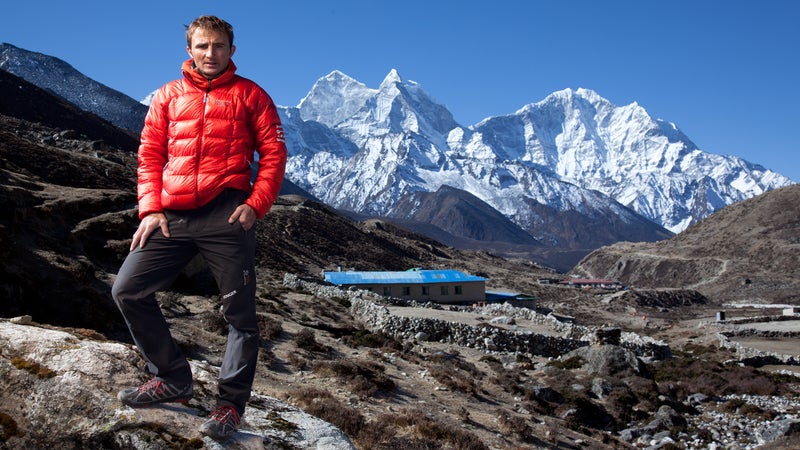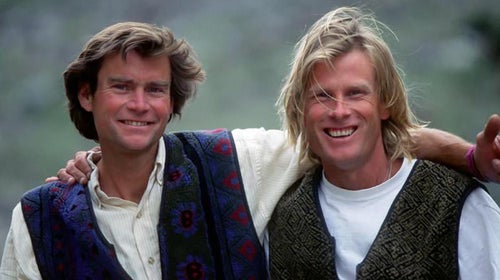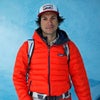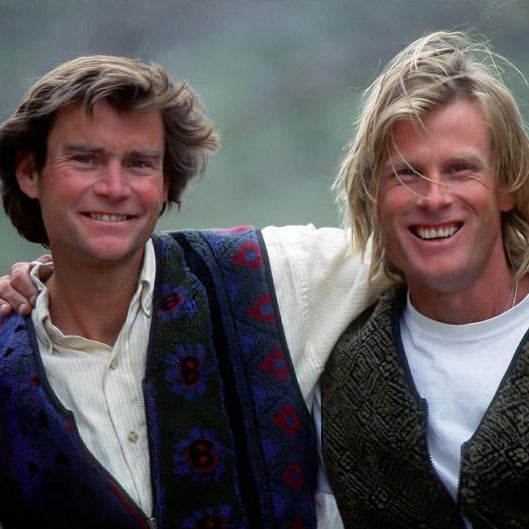On October 5, 1999, an avalanche high on the slopes of TibetŌĆÖs 26,289-foot Shishapangma swept down the mountainŌĆÖs south face, killing Bozeman, MontanaŌĆÖs Alex LoweŌĆöthen 40 and easily the best all-around mountaineer of his generationŌĆöand expedition cameraman and rising star David Bridges, 29, of Aspen, Colorado.
Lowe, Bridges, and Conrad AnkerŌĆöLoweŌĆÖs best friend and regular climbing partnerŌĆöwere leading a reconnaissance hike to scope out the couloir they hoped to ski from the mountainŌĆÖs summit, an objective that would have made their nine-man expedition the first by Americans to ski an 8,000-meter peak. ┬Ā
As the avalanche struck, Anker ran to the left while Bridges and Lowe ran downhill and right. Anker was partially buried and had a rib snapped and his head gashed open by the ice projectiles that hit him. But he could walk. Below him, in a group that was bringing up the rear, Utah skiers Andrew McLean and Mark Holbrook, along with Bozeman skiers Hans Saari (who died two years later in a ski accident in Chamonix, France) and Kristoffer Erickson*, avoided the avalanche. With Anker, they spent the next two days searching for any sign of Lowe and Bridges. They didnŌĆÖt find so much as a glove.┬Ā
ŌĆ£From my perspective there was just this big white cloud, and then it settled and there was nothing there,ŌĆØ Anker recalled during a phone interview from Bozeman, where he and Jennie landed on April 29 after spending the spring in Nepal. ŌĆ£And it was just so massive and so big. There wasnŌĆÖt that sense of closure.ŌĆØ┬Ā
Anker began helping LoweŌĆÖs widow Jenni to raise their three boys, Max, Isaac, and Sam, back in Bozeman. The two, in their shared grief, soon fell in love and were married in 2001. That story was the subject of by Jenni Lowe-Anker and chronicled in the documentary Meru, which played in theaters across the U.S. last year and made the short list for the 2016 Oscars.┬Ā
But now LoweŌĆÖs death appears to have a final resolution. Last week, on April 27, some 16 years, 6 months, and 22 days after their disappearance, the bodies of Lowe and Bridges were found by Swiss and German alpinists Ueli Steck, 39, and David Goettler, 37. The two partners are attempting to climb a new route up ShishapangmaŌĆÖs south face this spring.

ŌĆ£ItŌĆÖs kind of fitting that itŌĆÖs professional climbers who found him,ŌĆØ Anker says. ŌĆ£It wasnŌĆÖt a yak herder. It wasnŌĆÖt a trekker. David and Ueli are both cut from the same cloth as Alex and me.ŌĆØ
ŌĆ£I kind of never realized how quickly it would be that heŌĆÖd melt out,ŌĆØ says Jenni Lowe-Anker. ŌĆ£I thought it might not be in my lifetime.ŌĆØ
Anker and Jenni Lowe-Anker had spent much of the spring in the Khumbu region of Nepal working on the Khumbu Climbing Center (KCC), a project of the . TheyŌĆÖd missed Steck and Goettler by a day as the two alpinists acclimatized in the Khumbu before heading over to Chinese-controlled Tibet for their climb. (Shishapangma, the worldŌĆÖs 14th-highest mountain, is the only 8,000-meter peak that sits completely inside Tibet.) As Conrad and Jenni were preparing to fly home to Bozeman on the 27th, AnkerŌĆÖs phone rang. It was Goettler, attempting to confirm the identity of the two bodies theyŌĆÖd discovered partially melting out of the glacier.
ŌĆ£He said, We came across two bodies,ŌĆØ says Anker. ŌĆ£They were close to each other. Blue and red North Face backpacks. Yellow Koflach boots. It was all that gear from that time period. They were pretty much the only two climbers who were there.ŌĆØ
Anker hasnŌĆÖt seen photos, and there hasnŌĆÖt been a conclusive test, but heŌĆÖs already convinced. ŌĆ£WeŌĆÖre pretty sure itŌĆÖs them,ŌĆØ he says.┬Ā
Unlike the remains of climbers that are sometimes found high on Everest, the bodies of Lowe and Bridges are in a place where they can be recovered. (The body of guide Scott Fischer, a casualty of the 1996 storm on Everest that spawned Into Thin Air, remains on the mountain in line with the wishes of his family.)
Conrad, Jenni, and the three boys, now grown, are now planning to travel to Tibet during the summer monsoon. TheyŌĆÖll recover the bodies (they havenŌĆÖt yet been in touch with BridgesŌĆÖs family) and most likely return to Nyalam, Tibet, the closest town, to hold a ceremony.┬Ā
ŌĆ£The proper thing to do will be to take care of his body according to local practices,ŌĆØ says Anker. ŌĆ£TheyŌĆÖre still frozen into the ice.ŌĆØ
ŌĆ£ItŌĆÖs never something you look forward to,ŌĆØ says Jenni. ŌĆ£To see the body of somebody you loved and cared about. ┬ĀBut there is a sense that we can put him to rest, and heŌĆÖs not just disappeared now.ŌĆØ
This spring, like the last three, has been exceptionally warm and dry in the Himalayas. The increasingly common wind storms that deposit heat-absorbing dust on the glaciers have sped up melting even more. Everest Base Camp, at the head of the Khumbu Glacier in Nepal, has seen running streams and climbers relaxing in shorts and flip-flops, something that usually doesnŌĆÖt happen until May. ThatŌĆÖs one possible explanation for why the bodies could have melted out so quickly.┬Ā
For Conrad and Jenni, the event seemed to have added significance, given the recent events in Nepal. ŌĆ£Whether itŌĆÖs fate or coincidence or timing, you never know,ŌĆØ says Conrad. ŌĆ£The Khumbu is still bereft of tourists, and people in Nepal are still suffering,ŌĆØ says Jenni. ŌĆ£The people there are still so hopeful that thereŌĆÖll be a good season on Everest and that tourism will return. For us to be up there was a bright spot for them and for us. Conrad made an appearance at Base Camp, and that was meaningful to them and all the people that have worked with us on KCC. ┬ĀAnd then to have [Alex found on] the very last day. … I thought that was kind of serendipitous. It was like Alex appearing in a way to say, Hey, good work. IŌĆÖm done. IŌĆÖm done now.ŌĆØ
*Update: An earlier version of this story misspelled┬ĀKristoffer Ericsson's name.


